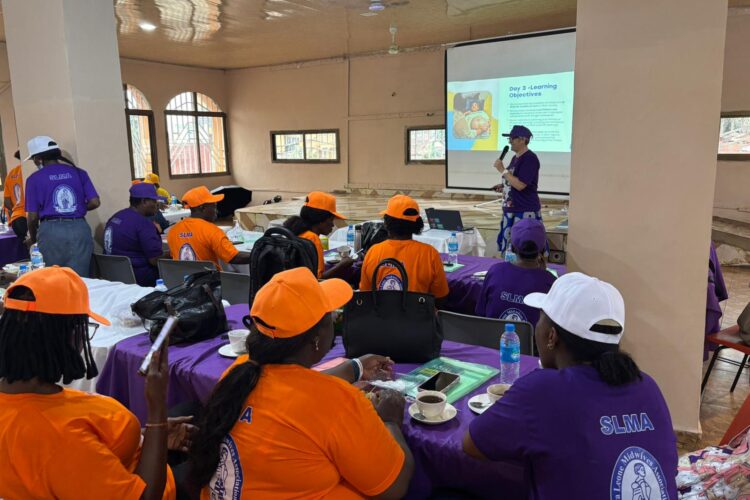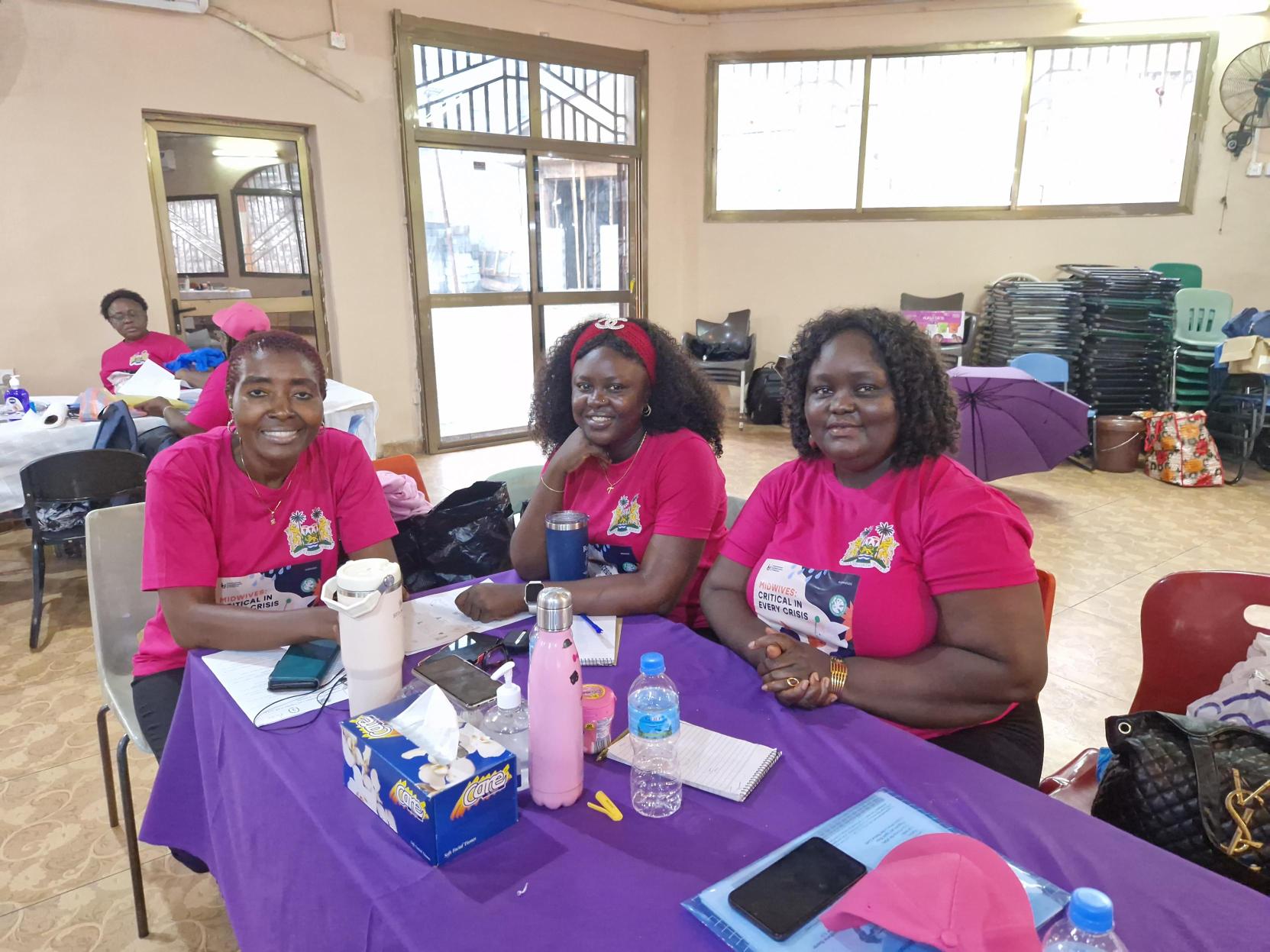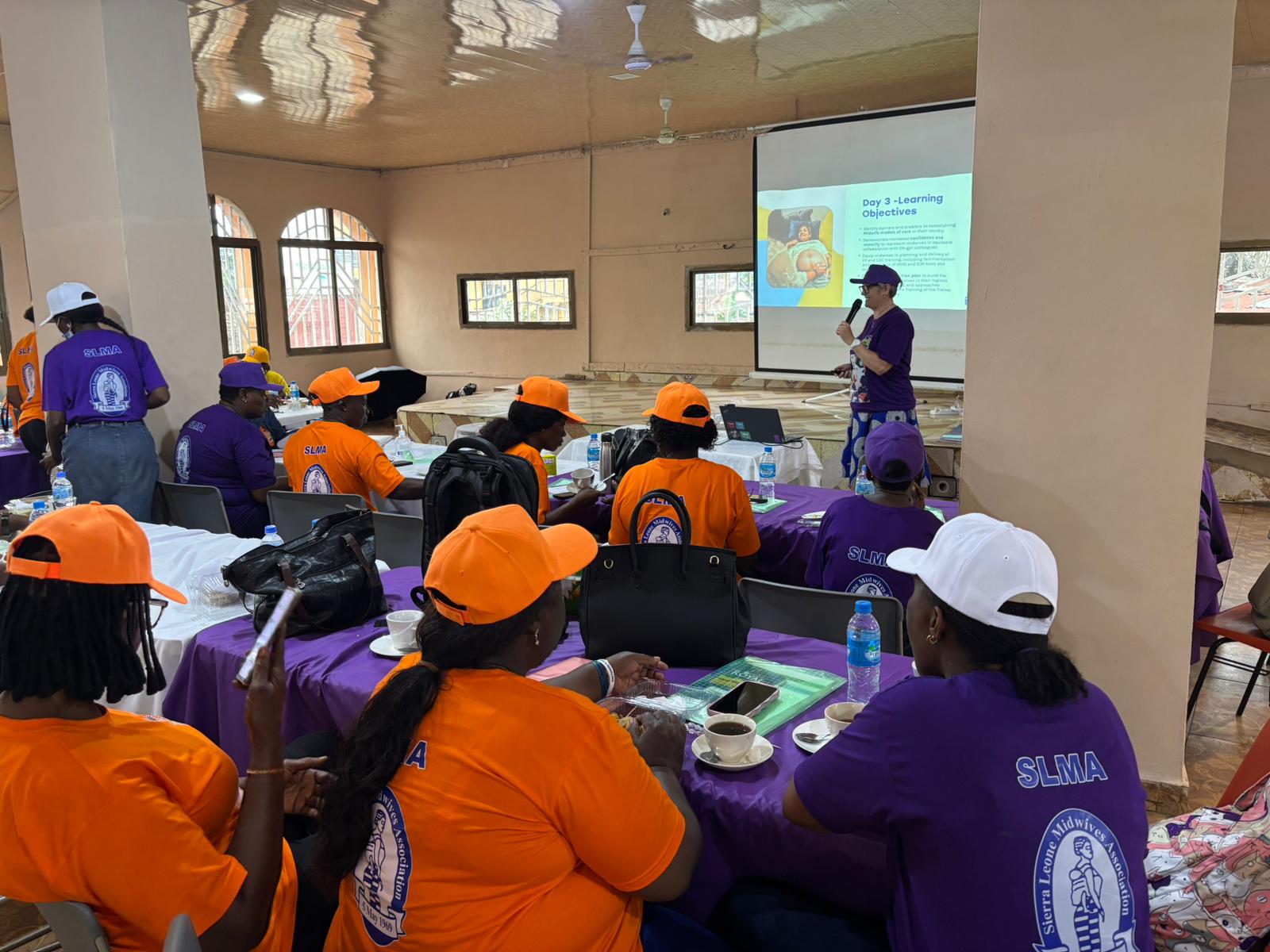Strengthening Midwifery and Sexual & Reproductive Health in Sierra Leone

Midwife advisors from the International Confederation of Midwives (ICM) recently travelled to Freetown, Sierra Leone, to work alongside the Sierra Leone Midwifery Association (SLMA) as part of the Collaborate for Women (C4W) Abortion and Contraception care Together (ACCT) initiative. Their visit marked the beginning of a series of capacity-building workshops designed to promote the sexual and reproductive health and rights (SRHR) of women and girls, in line with Competency 2 of the Essential Competencies for Midwifery Practice.
Over three days, 31 participants, including midwifery educators and clinical midwives, gathered to strengthen their clinical skills and understanding of rights-based care. Many had travelled long distances from remote rural provinces, where they are often the only skilled providers available. While already experienced in delivering essential services, they were eager to strengthen their capacity to provide family planning (FP) and Post-abortion Care (PAC) services and protect women’s autonomy, privacy, and confidentiality, and to ensure that care is always based on free and informed consent.
Health Context in Sierra Leone
Sierra Leone, a West African nation of around seven million people, faces complex health challenges. The country emerged from an 11-year civil war in 2002 and endured the Ebola epidemic in 2014. Its population is highly vulnerable to climate disasters such as flooding and mudslides. The healthcare system is severely understaffed, with only two skilled providers per 10,000 people—far below the World Health Organization’s recommended 23 per 10,000.
The country’s demographics also shape its public health priorities: approximately 70 percent of Sierra Leoneans are under 35. Teenage pregnancy rates are among the highest in the world, with 21 percent of girls aged 15 to 19 already pregnant or having given birth. 59 percent of women of reproductive age use modern contraceptive methods, and numbers are increasing.
Maternal health has improved significantly over the past two decades. The maternal mortality ratio fell from 1,682 deaths per 100,000 live births in 2000 to 354 in 2023 – a 79 percent reduction. The government aims to bring this number below 70 by 2030. Despite progress, unsafe abortion continues to contribute to an estimated 10 percent of maternal deaths, with 82 percent of illegal abortions in 2024 resulting in complications.
Abortion Law and Reform Efforts
Abortion in Sierra Leone is governed by the Offences Against the Person Act of 1861, a colonial-era law that criminalizes the procedure except when a woman’s life is in danger. There is currently no formal training for comprehensive abortion care in medical or midwifery education.
Reform has been attempted in the past. In 2000, a safe abortion bill passed Parliament but failed to receive final approval. More recently, in June 2024, the Safe Motherhood and Reproductive Health (SMRH) Bill was tabled to parliament. It aims to legalize abortion up to 14 weeks for any reason and later in cases involving serious health risks, foetal anomalies, or pregnancies resulting from rape or incest. While the bill has strong backing from women’s rights advocates, it has faced opposition from parts of the religious community in Sierra Leone and remains under parliamentary review.
Midwifery in Sierra Leone
Midwives and nurses form the largest segment of healthcare providers in the country, but their overall numbers remain far below national needs, and their distribution is uneven, leaving many rural areas without adequate care. In Sierra Leone, the midwifery workforce has grown remarkably, rising from fewer than 100 trained midwives in 2010 to about 1,579 in 2023. While this represents significant progress, a critical shortage persists, with just 2 midwives for every 10,000 people, only half the global benchmark of 4 midwives per 10,000.
Four midwifery schools operate nationwide, providing post-nursing education and more recently direct-entry programmes.
SLMA, founded in 1969, represents 645 midwives and advises the government on health policy. It works to improve working conditions for midwives and strengthen their role in providing essential services, particularly in family planning and post-abortion care.

Capacity-Building Workshops
The C4W workshops, co-designed by ICM and SLMA, explored the global context of sexual and reproductive health and rights and connected it to Sierra Leone’s local realities. A key theme was adopting a gender-transformative approach to service provision, one that actively challenges harmful gender norms and creates more accessible services for women. Participants engaged in values clarification exercises and discussions aimed at highlighting the impact of stigma and bias on women’s access to, and experience of accessing SRH care and focused on improvement to services and how care can be delivered in a confidential, respectful manner. On the second day of the workshop, the practical skills labs stood out as a highlight for many participants. They noted that a lack of an enabling environment, coupled with persistent myths and misconceptions about certain contraceptive methods, had contributed to a decline in their skills and, ultimately, to low uptake of these methods.
Guided by experienced facilitators from the Ministry of Health and the Midwifery Association, midwives participated in simulation training to practise inserting and removing intrauterine devices (IUDs) and implants, as well as performing manual vacuum aspiration for post-abortion care. For those working in remote rural areas, this hands-on experience was especially valuable.
The third day focused on advocacy. Midwives developed strategies to introduce specific, measurable and achievable change in their workplaces, from improving privacy in clinical settings to ensuring all staff uphold the principles of respectful maternity care.
Barriers to Sexual and Reproductive Health
The workshops also uncovered significant barriers that women, particularly adolescents, face in accessing sexual and reproductive health services. Many teenage girls are not allowed to visit family planning clinics without parental consent or avoid doing so due to the risk of someone from their community seeing them entering a clinic. Privacy concerns strongly influence which methods women choose, with implants often preferred for their discreetness. Periodic shortages of equipment and commodities such as contraceptive supplies further limits midwives to provide services and women’s choices.
Cultural norms and gender stereotypes remain deeply entrenched. The midwives shared experiences of men being seen as the decision-makers regarding family size and sexual activity, while women are expected to be compliant caregivers. Such attitudes contribute to resistance to contraceptive access, particularly for young, unmarried women.

Increased knowledge of the ICM Essential Competencies for Midwifery practice
Workshop participants completed pre- and post-workshop confidence assessments to evaluate their self-assurance in providing and supporting midwife-led Family Planning and Post Abortion Care Services. Before the workshop, participants reported low confidence in their familiarity with the ICM Essential Competencies. Following the training, confidence in this area improved significantly, though it remained an area for growth. The highest post-workshop confidence was seen in understanding of Midwifery Models of Care and using tools like the WHO Medical Eligibility Criteria (MEC) app to support contraceptive decision-making. Participants particularly valued sessions on postpartum and interval IUD insertion, post-abortion care, and comprehensive abortion care, appreciating the practical, hands-on approach that enhanced their skills.
Participants highlighted several standout sessions, including Rights-based Care for its strong emphasis on women’s autonomy. Group discussions examined how stress and the absence of an enabling environment can influence midwives’ attitudes toward clients, underscoring the need to provide respectful care to all, regardless of a caregiver’s stress level or a client’s age and circumstances. They emphasised that avoiding judgmental behaviour is crucial, as it can discourage clients from seeking care and contribute to increased maternal mortality.
Key areas for improvement included empowering adolescents to access services, promoting family planning to prevent unwanted pregnancies and unsafe abortions, and implementing school-based education campaigns. Other priorities were enhancing privacy in healthcare facilities and strengthening antenatal counselling to encourage postpartum contraceptive uptake.
Resilience and the Road Ahead
Sierra Leone’s midwives have consistently demonstrated resilience and dedication, providing care during crises such as Ebola, COVID-19, and other challenges. The recent workshops showed not only their commitment to expanding their clinical skills, but also their determination to advocate for the rights and dignity of the women they serve.
The partnership between ICM and SLMA has contributed to the momentum for advancing sexual and reproductive health in Sierra Leone. While legal reforms, systemic improvements, and cultural change regarding women and girl’s reproductive autonomy will take time, midwives remain at the heart of this transformation—working to ensure that every woman and girl can access safe, respectful, and rights-based care.
Interprofessional collaboration
During the country visit, the ICM team carried out facility visits, including one site visited twice, first as guests of the midwives and later accompanied by obstetrician-gynaecologist colleagues. This gave the team different perspectives and insights to collaborative practices. The visits covered two large referral hospitals with high birth rates and two district hospitals with lower birth rates. All facilities had dedicated family planning rooms stocked with commodities; however, systemic changes were needed to reach women before their postnatal discharge to improve accessibility and contraceptive uptake. Observations in the maternity units revealed a lack of privacy for service users and issues with overcrowding, alongside clear evidence of project efforts aimed at strengthening service delivery and improving infrastructure.
The ICM team’s visit was scheduled to coincide with that of International Federation of Gynecology and Obstetrics (FIGO) C4W project lead. Together, ICM and FIGO co-hosted a three-hour workshop attended by a wide range of stakeholders. Discussions were focused on workforce optimisation for increase access to FP and PAC services. Alongside discussions about doctors and midwives’ scope of practice, the participants touched upon the difficulties of coordinating services when many different types of healthcare providers are involved. As part of Sierra Leone’s efforts to reduce maternal mortality, new healthcare cadres have been introduced. Maternal and Child Health (MCH) aides deliver basic nursing and midwifery services in hard-to-reach areas, while to address the shortage of obstetric surgeons, Community Health Officers and Physician Assistants have been trained as Surgical Assistants. By 2023, this cadre was performing over 50% of caesarean sections and had become a vital resource, especially in underserved regions. When midwives and obstetrician-gynaecologists engage in discussions on interprofessional collaboration and scope of practice, it is important to acknowledge and integrate the roles and contributions of these additional healthcare cadres.
Read more – Groundbreaking workshop to strengthen collaboration between midwives and OBGYNs | Figo
Conclusion: Mutual Learning and Strengthening Midwifery in Sierra Leone
The visit of ICM Midwife Advisors to Sierra Leone was more than a capacity-building mission, it was a shared journey of learning and growth. While midwives in Sierra Leone strengthened their practical skills in family planning, post-abortion care, and respectful, rights-based service delivery, the ICM team deepened its understanding of the local context, challenges, and innovations shaping maternal health. The collaboration highlighted the importance of client-centred care, cross-cadre teamwork, and health system strengthening, reinforcing the central role of midwives in advancing sexual and reproductive health and rights. Continued advocacy for legal reform through the Safe Motherhood and Reproductive Health Bill remains essential. Midwives stand at the heart of transforming women’s health in Sierra Leone, combining clinical skill, compassion, and resilience to ensure rights-based care reaches every woman.